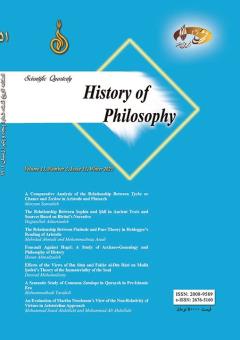An Evaluation of Martha Nussbaum’s View of the Non-Relativity of Virtues in Aristotelian Approach
Subject Areas : New findings regarding the development of ancient western philosophy (Greek and Hellenistic Philosophies)Mohammad Saeid Abdollahi 1 , Mohamad Ali Abdollahi 2
1 - PhD candidate of Philosophy of Ethics (corresponding author), University of Qom, Qom, Iran
2 - Associate Professor, Philosophy Department, University of Tehran, College of Farabi, Qom, Iran
Keywords: ethics, objectivity, virtues, Nussbaum, relativism, Aristotle,
Abstract :
The nature, role, and quality of attaining virtue hold an important place in Aristotle’s philosophy. He tried to provide a systematic account of Man’s goal of achieving virtue. Martha Nussbaum, the contemporary commentator of Aristotle, believes that some contemporary philosophers, although considering themselves as advocates of Aristotle, have some disagreements with him regarding certain key issues. Their mistake is rooted in their relativist approach to Aristotelian virtues. This approach stands in clear opposition to other views of Aristotle, who defended a single objective description of goodness or happiness for Man. Aristotle’s ethical virtue can explain many of the problems that relativists tried to solve and, at the same time, claim to be objective in the sense that relativism in one specific context does not mean being a relativist. For example, in other sciences, such as medicine and maritime, attention is devoted to particular cases, but it does not mean that the scholars and scientists in these fields are relativist. According to Nussbaum, Aristotelian virtues can explain virtue better than the virtues intended by relativists. However, this is the case when the specific features of a context are meticulously examined, and both shared and unshared characteristics are taken into consideration so that the best choice is made. In this paper, after explaining Nussbaum’s view concerning Aristotelian virtues, the author investigates three objections to his theory and, finally, clarifies the non-relativity of virtues in Aristotle’s thoughts.
1. ارسطو. (1364). سیاست، ترجمه حمید عنایت، تهران: امیر کبیر
2. ارسطو.( 1381). اخلاق نیکوماخوس، ترجمه محمد حسن لطفی، چ2، تهران: نشر طرح نو.
3. آککریل،جی. ال.(1380) . ارسطوی فیلسوف، ترجمه علی رضا آزادی، تهران: نشر حکمت
4. خزاعی، زهرا.( 1389). اخلاق فضیلت، تهران: نشر حکمت.
5. السدیر، مک اینتایر.( 1376). اخلاق فضیلت مدار، ترجمه حمید شهریاری، مجله نقد و نظر ، شماره 13، ص 286 – 299
6. گاتری، دبلیو. کی .سی.(1376) .تاریخ فلسفه یونان، ترجمه حسن فتحی، تهران: نشر فکر روز.
7. ماستلر، تیموتی. ( 1399 ) . نسبیگرایی، ترجمه رحمان شریف زاده، تهران، نشر علمی فرهنگی.
8. نوسباوم، مارتا. ( 1374). ارسطو، ترجمه فولادوند، تهران: نشر نو .
9. Hamilton, w. (1861). The Metaphysics of Sir Hamilton, Boston .
10. Craij, Edward .(1998). Routledge Encyclopedia of philosophy, Londan Rotledge.
11. Liddell and Scott .(1882). An Intermediae Greek–English Lexicon. New York: American Book Company, Seventh Edition
12. Hampshire, S. (1983). Morality and Conflict. Cambridge, Mass.: Harvard University Press.
13. Hurley , s (1993) Commentator: Martha Nussbaum Non-Relative Virtues: An Aristotelian Approach, in: The Quality of Life, edited by Nussbaum, Martha
14. Nussbaum, M (1986). The Fragility of Goodness: Luck and Ethics in Greek Tragedy and Philosophy. Cambridge: Cambridge University Press.
15. Nussbaum, M (1988 ) Non-Relative Virtues :An Aristotelian Approach MIDWEST STUDIES IN PHILOSOPHY, p. 32-53
16. Nussbaum, M. (1972). 'Psuche in Heraclitus', Phronesis, 17, 1-17, 153-70.
17. Schiller, F.(1912).Studies In Humanism , 2nd, London : Cambridge university Press .
18. Siegel, Harvey. (1987). Relativism Refuted, Riedel publishing company.
19. Sturgeon, N. (1984). Review of Foot, Journal of Philosophy, 81, 326-33
20. Williams, B. (1985). 'Philosophy', in The Legacy of Greece, ed. M. I. Finley. Oxford: Oxford University Press.
21. Windelband, W.(1901 ). A History Of philosophy, London: Macmilan


